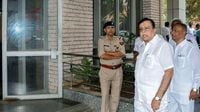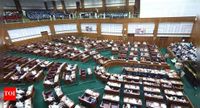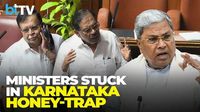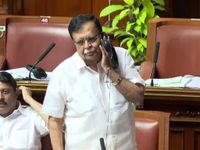BENGALURU: A political storm erupted in Karnataka assembly on March 20, 2025, following shocking allegations of a honey-trap scandal involving senior minister KN Rajanna and 48 others, including legislators, political leaders, and judges. The uproar began after Rajanna, during an assembly session, publicly admitted that he himself had fallen victim to a honey trap. This revelation set off a series of heated debates and explosive claims that have sent shockwaves through the political landscape of Karnataka.
Rajanna accused a senior Congress leader of orchestrating the scandal to target political opponents, suggesting that it was part of a larger political strategy ahead of upcoming leadership challenges. “It is a serious issue. If we must save the dignity of our members, we must put a brake on such incidents,” said Karnataka's Deputy Chief Minister G Parameshwara, who vowed to initiate a high-level probe based on a formal complaint from Rajanna.
The issue first surfaced on March 19, when former minister and BJP member V Sunil Kumar accused the ruling Congress government of running a “honey-trap factory.” He demanded that the government take strict action against those involved in such activities. Senior BJP MLA Basanagouda Patil Yatnal further alleged that the controversy was deliberately orchestrated by a senior Congress figure to defame rivals in anticipation of a power struggle within the party.
In a dramatic moment in the house, Rajanna claimed that not only he but an alarming total of 48 individuals, ranging from lawmakers to judges, have been honey-trapped, with obscene videos purportedly being circulated. His assertion highlighted a pervasive issue within the Karnataka political arena, with implications extending beyond state lines to national levels.
Citing specific claims, Rajanna hinted at one incident involving a minister from Tumakuru district, stating, “Me and Parameshwara are the only ministers from Tumakuru.” His statements fueled speculation, with Rajanna alleging that several individuals possessed damaging CDs and pen drives related to the alleged honey traps.
The debate intensified further, with BJP MLA Munirathna, who himself is facing allegations of sexual harassment, described his situation as one of political vendetta. “I have young grandchildren. Please think about how they will feel when they go to school,” he urged, calling for a full investigation. He demanded, “You hang me if I am wrong, but do not indulge in character assassination.”
BJP state president BY Vijayendra criticized the Congress government while equally demanding clarity from Rajanna regarding the orchestrator of the alleged scandal. “Neither judges nor the Special Investigation Team (SIT) can investigate this,” he argued, insisting that only a comprehensive investigation by federal authorities, such as the CBI, would be warranted.
Public Works Minister Satish Jarkiholi joined the calls for transparency, revealing that there had been unsuccessful attempts to entrap a senior minister in similar scandals in the past. “If there is a complaint, it will help the probe,” he stated, affirming his commitment to call for legal action against those responsible for such honey traps.
Meanwhile, Deputy Chief Minister DK Shivakumar echoed calls for an in-depth investigation, stating, “Let a complaint be filed first, and a thorough investigation should follow.” His remarks came amid growing impatience within the assembly, as members demanded judicial and political accountability in light of the allegations.
The honey trap scandal has rapidly escalated into a sensational controversy, with implications reaching national parties and drawing significant media attention. Notably, accusations have raised questions about the integrity of journalists and lawmakers alike, with Rajanna asserting, “The public must know who the producers and directors behind this are.”
Amid the chaos, Chief Minister Siddaramaiah defended the integrity of his administration, promising that no one involved in such tactics would be protected. “It is the government's responsibility to ensure that the guilty are punished according to law,” he emphasized. He reiterated that a high-level investigation would be executed if Rajanna filed a complaint and urged those with knowledge about the scandal to come forward.
Rajanna's remarks about Karnataka becoming a “CD and pen drive factory” were not merely metaphorical; they show an alarming trend of political manipulation through illicit means. Both opposition parties and the ruling Congress have been embroiled in similar crises, highlighting a significant and troubling pattern in Karnataka’s political dynamics.
As the assembly sessions continue, Rajanna's call for clarity and accountability reverberates through Karnataka’s political circles, prompting an investigation that will likely unfold with widespread scrutiny. The implications of this scandal may very well shape the political landscape in Karnataka leading into the subsequent elections, revealing the potential for deep-seated corruption and abuses of power that extend well beyond the state’s borders.







